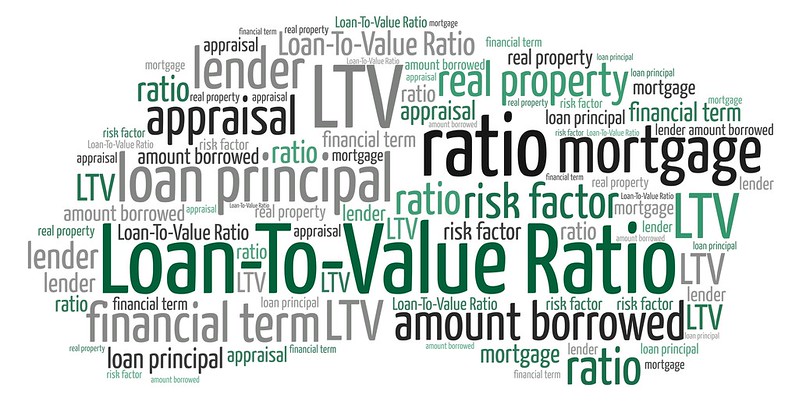FHA, APR, DTI, PMI, FICO, and LTV are just a few of the acronyms you’ll see in the mortgage and banking world, but what do they mean? Whether you are a borrower or a lender, you should know what all these stand for, and more importantly, how they impact your loan.
Perhaps the most important of these is LTV, or loan to value. Your LTV can affect your interest rate, terms, and insurance premiums on your real estate loans, so it’s imperative you have a solid understanding of what LTV is.
What Is LTV in Real Estate?

Image via Flickr by EpicTop10.com
Loan to value is a ratio that expresses the amount of a loan as it relates to the actual market value of the asset securing the loan — in this case, a real estate property. It is expressed as a percentage. A simple example would be a lender that approves a loan for $100,000 to purchase a real estate property that has a market value of $200,000, in which case the loan to value would be 50%.
Loan to value mortgage calculations are most commonly done at the time you purchase a property, but they can be done at any point during your loan. The calculation is done by dividing the loan amount by the value of the asset and then multiplying by 100 to convert to a percentage. So in the above example, you are taking 100,000 and dividing it by 200,000, which equals 0.5. You then multiply 0.5 by 100 and get 50%.
Loan to value is always changing for a variety of reasons. One is because your asset will change in value, either through appreciation, where the value goes up, or depreciation, where the value goes down. In real estate, it is much more common for values to rise over time. That’s why real estate is such a great investment.
However, properties can come down in value based on market influences. When the property value drops, the loan to value increases. If it increases beyond 100% of the loan, you are considered underwater. This can also happen at the beginning of your loan if you have high closing costs and fees.
Your loan to value will decrease every time you make a payment, if only a little. But over time, this will add up. As LTV decreases, so does the level of risk to the lender. In many real estate loans, a maximum loan to value ratio is built into the qualifying process.
How Does LTV Affect My Loan?
Lenders will typically price their loans based on risk, which means setting higher interest rates for loans they deem risky. If you have bad credit, you might not even qualify for a loan. Those with subpar credit will pay higher interest rates than those with good or excellent credit.
Loan to value mortgage calculations is another way lenders assess risk. The higher the loan to value, the more the lender will have to lose should the borrower fail to repay the loan. Therefore, a high loan to value mortgage has a higher interest rate.
Having a high loan to value can impact more than just your interest rate. In conventional home mortgages, you might be required to buy private mortgage insurance (PMI). That’s because conventional loans aren’t backed by a federal program to guard against default. Usually, a loan to value greater than 80% will require PMI.
PMI can cost anywhere between 0.5% and 1% annually, which could add several hundred dollars to your mortgage payment each month. You’ll be required to pay PMI until your loan to value falls beneath a predetermined amount, usually around 80%. You’ll want to pay close attention to your loan to value if you have PMI you want to be removed.
Good LTV Mortgage Loans
A good loan to value mortgage loan will generally be 80% or less. As stated above, a conventional loan with a loan to value of greater than 80% will require PMI. To avoid PMI, the federally backed programs offer loans with up to a 100% LTV for veterans, and the FHA loans can be as high as 96.5%.
These federally backed loans enable you to afford more, in part because you’ll have to come up with less money as a down payment. A 100% LTV loan will require no down payment, whereas a 96.5% LTV will mean you’ll have to come up with the 3.5% as a down payment.
Hard Money Loans
If you’re a real estate investor, you might be able to take advantage of hard money loans. Also known as bridge loans, they are typically used in the acquisition process. They can be used for property improvements and renovations too.
These are private money loans that enable you to bridge gaps while waiting for financing. Rates are more stable than institutional loans because they aren’t tied to typical market indices. You don’t have to be a corporation to take advantage of Hard Money loans. At Titan Funding, we can tailor hard money loans to your specific situation.
Hard money loans are easy to get because your credit score isn’t a factor; rather, they are based on the asset you are financing against. Approval is quicker as well, taking a fraction of the time. If you’re flipping houses, a hard money loan can be a perfect way to renovate. The same holds true if you’re trying to renovate before leasing a property.
Private Money Investing
If you’re interested in diversifying your portfolio, investing in these private money loans is a great option. At Titan Funding, we have a private lending group composed of a team of banking professionals ready to help you put your money into real estate without the hassle of managing the properties yourself.
We do this by putting your money behind these private money loans, which are called real estate debt funds. These funds are distributed as hard money or private money loans to other individuals and backed by their assets to limit risk.
Talk To a Professional Today
Whether you need a traditional mortgage or a private money loan, you will benefit from working with Titan Funding. You can contact us with any questions you might have. Our friendly and professional staff will walk you through the process of getting funding or beginning investing.

